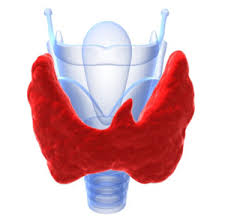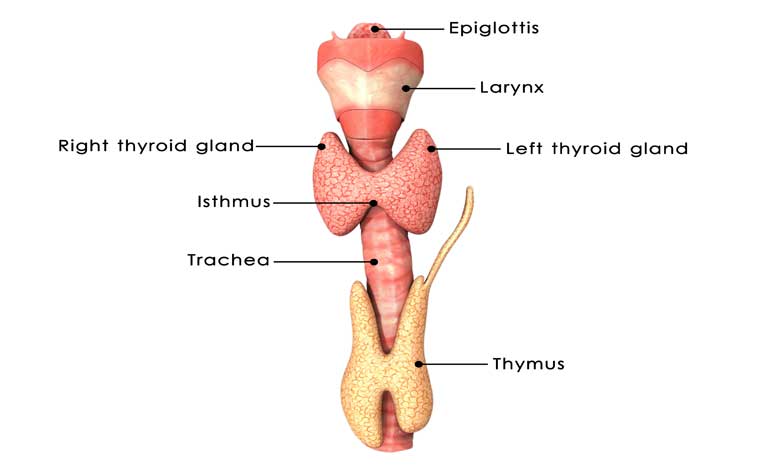Hyperthyroidism

Knowledge is Power.
True/False - Quiz: Do You Understand Hyperthyroidism?
Information - Hyperthyroidism
 Your thyroid is a butterfly-shaped gland at the base of your neck that regulates metabolism. Hyperthyroidism occurs when the thyroid gland malfunctions and overproduces the hormone thyroxine. This condition can make patients suddenly lose weight, as they burn calories extremely fast.
Your thyroid is a butterfly-shaped gland at the base of your neck that regulates metabolism. Hyperthyroidism occurs when the thyroid gland malfunctions and overproduces the hormone thyroxine. This condition can make patients suddenly lose weight, as they burn calories extremely fast.
Symptoms of Hyperthyroidism
In addition to weight loss, symptoms of hyperthyroidism include:
• Heat intolerance
• Fast heart rate
• Heart palpitations
• Shortness of breath
• Muscle loss
• Tremors
• Sweating
• Irregular or absent menstrual cycle in women
A number of thyroid conditions can cause hyperthyroidism, including toxic adenoma, Plummer’s disease and inflammatory thyroiditis. There are three types of inflammatory thyroiditis: one that occurs right after pregnancy, silent thyroiditis (painless) and subacute thyroiditis (very painful). One of the most common causes of hyperthyroidism is Graves' disease, an autoimmune disease. If you have thyroid disease in the family, whether that's an overactive thyroid or an underactive thyroid, you have an increased risk of developing Graves' disease.
Hyperthyroidism Treatments
 Hyperthyroidism can lead to a number of health complications, including heart disease, eye problems, brittle bones and swollen skin. It’s important to consult with your primary care provider or an endocrinologist if you think you might have hyperthyroidism. Your physician will do a physical exam and blood tests to diagnose hyperthyroidism. If you do have hyperthyroidism, your doctor may do further testing such as a radio iodine uptake test or a thyroid scan to determine why your thyroid is overactive.
Hyperthyroidism can lead to a number of health complications, including heart disease, eye problems, brittle bones and swollen skin. It’s important to consult with your primary care provider or an endocrinologist if you think you might have hyperthyroidism. Your physician will do a physical exam and blood tests to diagnose hyperthyroidism. If you do have hyperthyroidism, your doctor may do further testing such as a radio iodine uptake test or a thyroid scan to determine why your thyroid is overactive.
Treatments for hyperthyroidism include:
• Antithyroid medication, which prevents the thyroid from producing excess amounts of T4 and T3 hormones
• Radioactive iodine, which works by gradually destroying the thyroid to reduce hyperthyroid symptoms
• Thyroidectomy, which is total or partial surgical removal of the thyroid
Your primary care provider or endocrinologist can help you understand the benefits, risks and side effects of each thyroid treatment.
Talk to your endocrinologist if you'd like more information on hyperthyroidism.
Visit HealthChoicesFirst.com for more videos and resources on endocrinology.
Print this Action Plan and check off items that you want to discuss with your healthcare provider
-
Symptoms of hyperthyroidism include heat intolerance, fast heart rate, heart palpitations, shortness of breath, muscle loss, tremors, sweating and irregular or absent menstrual cycle in women.
-
A number of thyroid conditions can cause hyperthyroidism, including toxic adenoma, Plummer’s disease and inflammatory thyroiditis.
-
There are three types of inflammatory thyroiditis: one that occurs right after pregnancy, silent thyroiditis (painless) and subacute thyroiditis (very painful).
-
One of the most common causes of hyperthyroidism is Graves' disease, an autoimmune disease. If you have thyroid disease in the family, whether that's an overactive thyroid or an underactive thyroid, you have an increased risk of developing Graves' disease.
-
Treatments for hyperthyroidism include antithyroid medication, radioactive iodine and thyroidectomy.

